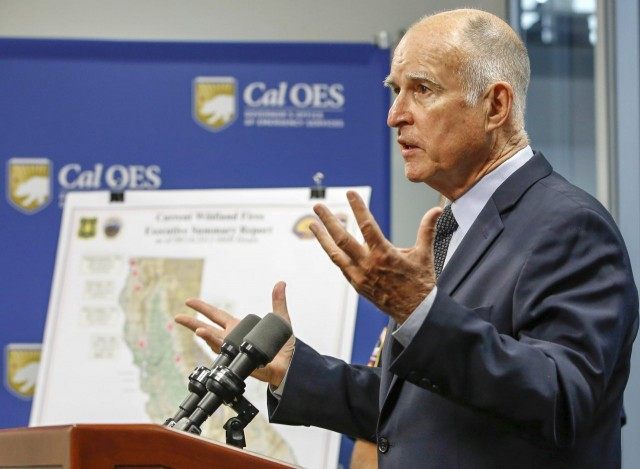SAN FRANCISCO (AP) — A worker in the state oil and gas regulatory agency lodged a whistleblower’s complaint over being ordered to prepare a state map of the oil and gas potential, history and geology of California Gov. Jerry Brown’s family ranch, the worker and her attorney said Monday.
Jennie Catalano, a mapping specialist who has been with the state Department of Conservation for 18 years, brought the complaint. She contends that she faced unspecified retaliation after being suspected of lodging the complaint over being directed to do the personal work for Brown, said her attorney, William Rehwald.
“I was asked to help her in part because she does feel that she’s being retaliated against because she’s a whistleblower,” Rehwald said.
State records obtained by The Associated Press show Brown in June 2014 directed senior officials at the Department of Conservation’s oil and gas regulatory agency to map, research and assess the oil, gas and mineral history and potential of his 2,700-acre family ranch in Northern California near Williams.
State law prohibits elected officials from using state resources for personal purposes. Spokesmen for Brown and the oil and gas agency say the governor is allowed to access public records the same as any member of the public, and say that oil and gas regulators routinely do such research for the public.
However, four oil-industry professionals and three former officials whose tenure with the state oil and gas agency spanned from the 1980s to 2013 told the AP they know of no other instance where the state performed that scale of satellite-imaged geology and drilling map, development assessment and compiling of state records for a private individual.
Brown’s request to oil regulators points to the complex way that the governor, an internationally known advocate of renewable energy, approaches oil and gas issues in his own state. While spearheading ambitious programs to curb the use of climate-changing fossil fuels, Brown also has sought to spur oil production in California, the country’s No. 3 oil-producing state.
Contacted at work, Catalano confirmed the whistleblower’s complaint but declined further comment. Teresa Schilling, a spokeswoman for the Department of Conservation, declined to comment Monday, saying the agency does not comment on potential personnel matters.
Whistleblower complaints to the state are confidential, and no other details were available including when the complaint was filed.
The state research on Brown’s ranch came to light in a lawsuit brought by farmers in Kern County, who allege Brown’s administration and the oil industry intentionally circumvented federal law meant to protect groundwater from oilfield pollution. The farmers’ lawyer, Patricia Oliver of the R. Rex Parris law firm, is seeking to depose Catalano and other state oil and gas regulators.
The state attorney general’s office is contesting the law firm’s subpoenas for the oil and gas agency employees. The attorney general’s office refused to comment Monday, referring questions to Brown’s office and the state oil and gas division.
Meanwhile, the three former senior officials at the state’s oil and gas division told the AP that they never saw the agency do any work for an individual approaching the scope of the map, assessment and records research that the oil regulators did for Brown in June 2014.
“What they did was a misuse of government time and employee time and resources — that’s the No. 1 reason we would never do it,” said Burton Ellison, a former senior oil and gas engineer at the state’s Division of Oil, Gas and Geothermal Resources, or DOGGR.
“Would we go generate a map for them? No,” Ellison said. “Whatever we gave out would have to be available to all the public … They can get records from DOGGR, but we would never assemble it.”
Michael Stettner, a former program manager at the oil and gas division, said the agency’s workers would sometimes put together a few pages of state records for a private individual if asked for help. However, Stettner called the state’s assertion that it regularly did the scale of mapping, assessment and record compilation that it did for Brown “pure BS.”
Asked to provide examples of similar work, Brown’s office last week provided the AP with two records compilations that the oil and gas agency did for public bodies, rather than private individuals, and a third report, to an unidentified private individual, that included nine pages of record photocopies and concluded further drilling in the person’s area was unlikely. There was no customized map and no geological assessment of the person’s land, as with the governor.
Schilling, the oil and gas division’s spokeswoman, said the state still was compiling more examples of other work.
Bohlen, the state oil and gas supervisor, told the Los Angeles Times in a story published Monday that Brown somehow saw Bohlen’s emails to employees relaying the governor’s request of the report, and cautioned him.
“He asked me to be careful about what I sent by email because of public record laws,” Bohlen said.
Bohlen ultimately hand-delivered the report for the governor, lawyers for the regulatory agency told the AP.
Neither Bohlen nor the governor’s spokesmen responded to questions why Brown warned about keeping the work done for him out of email if the work was proper.
Stettner, the former long-time program manager at the oil and gas division, says the state workers involved in the work for the governor described Brown being irate over Bohlen discussing the ranch work in email.
Current oil and gas division employees say Brown was “extremely upset w/ Bohlen using the email to communicate with him,” Stettner said in an email to the AP. “I’m putting it nicely compared to the graphic way it was described to me.”
However, Bohlen denied that Brown threatened to fire him for discussing the ranch research in an email, as alleged by Oliver, the attorney for the Kern County farmers.
“The Governor did not threaten me in any way and those claims are false,” Bohlen said.

COMMENTS
Please let us know if you're having issues with commenting.